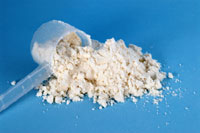
For most people concerned with antiaging, this will come down to a choice about which meal replacements supplement to use. I will offer my experience with this and make some suggestions as well.
For those of you that have special dietary needs, such as being on a casein free diet, or being allergic to a particular protein such as whey, the choice for the best protein supplement gets narrowed down a bit. You will need to know a few things before you select the best protein supplement for you.
You will need to know
- Types of proteins
- Daily requirements in grams
- Any allergies you have to types of proteins
- Timing of protein intake
- A source for top quality formulas
There are several main types of proteins
- whey
- caseins
- egg white
- soy
- vegetable
Whey is extracted from milk and is digested rather fast, thus making it a great choice following a workout. There are some concerns that whey concentrate can raise blood sugar a bit because of it’s lactose content. Whey isolates have this removed and so do not have this problem.
Caseins come from milk and digest much slower. They are good for evening or other times when you want a slow release of amino acids into the bloodstream, with no elevation in blood sugar. Caseins show best results for gaining muscle and getting leaner. They are anti-catabolic, and help prevent muscle loss.
Egg white comes from chicken egg whites and is a very high grade protein with a favorable balance of amino acids. It is also a good source of sulfur and allows you to get more egg protein into your diet without having to eat it all in the form of whole eggs. These proteins digest easily as well.
Soy is extracted from soybeans and is therefore not an animal based product. This means it can be used by vegetarians to get more quality proteins into their diet. It also contains isoflavones, which have beneficial anti-estrogenic properties.
Vegetable proteins are extracted from peas and have a rate of digestion similar to whey isolate. Again this can be used as a high quality supplement by vegetarians, and is perhaps the most economical of the commercial proteins.
Which is the best protein supplement? All of the above mentioned proteins have their place in an antiaging program. It is all about finding what works for each individual, AND finding good sources for supplemental proteins.
Daily requirements in grams
This is a controversial area, because many experts disagree about how much is required. I would suggest that the level for a healthy active adult should be about 1 gram for each pound of lean bodyweight. Try to get at least 30-50 grams of good quality proteins three times per day, or otherwise broken up among 4-6 smaller meals.
This however also depends on health status, training intensity, age and metabolic type. I will post links to articles that discuss this subject in more depth, and will help you to more precisely calculate your individual needs. A good meal replacement supplement can help complete your daily needs and offer increased convenience as well!
Food allergies can create problems in getting the required amount of proteins. Some individuals have allergies or sensitivities to caseins and so require a casein free diet. Others do not react well to whey or egg based proteins. Fortunately, there are many good products to choose from that can fit nicely into the restrictions caused by food allergies.
Click Here for Part 2 of This Article
Hyaluronic Acid Benefits For Antiaging
The Best Protein Supplement Part 2



